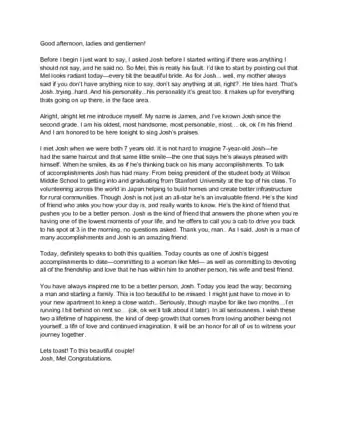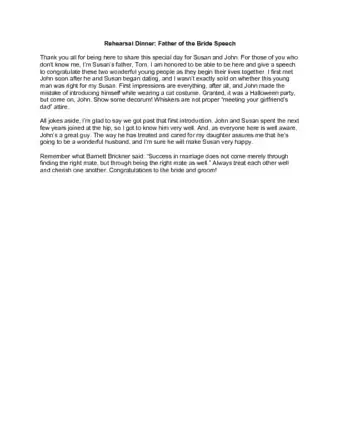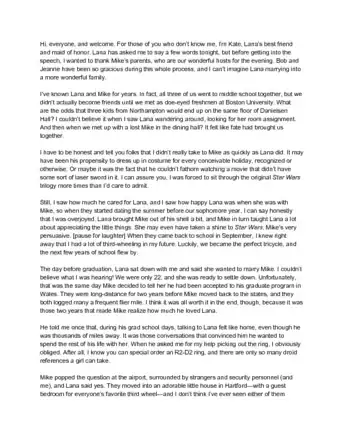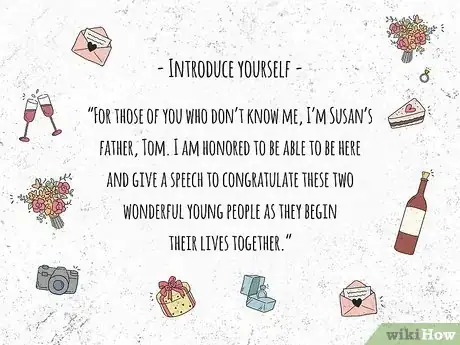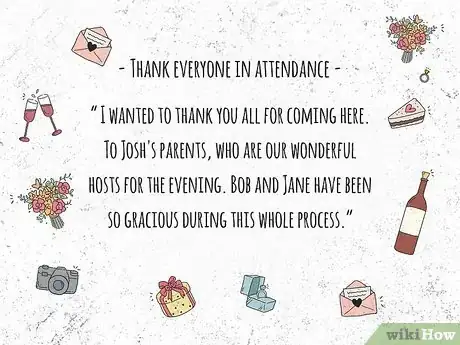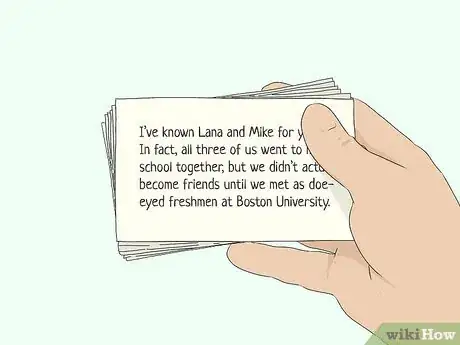This article was co-authored by Jenny Yi. Jenny Yi is the Founder of Chloe+Mint, an award-winning full service event planning company that specializes in wedding planning, design and floral design. Jenny has been in the industry for over 5 years, and also works closely with notable brands and celebrities on branding and events.
There are 7 references cited in this article, which can be found at the bottom of the page.
wikiHow marks an article as reader-approved once it receives enough positive feedback. In this case, several readers have written to tell us that this article was helpful to them, earning it our reader-approved status.
This article has been viewed 575,516 times.
For most people, their wedding day will be among the most important days of their lives. As such, it is customary for a close friend or loved one to deliver a speech congratulating the newlyweds on their union. This can be a nerve-wracking prospect if you’re the one called upon to give a speech in front of a big, expectant crowd. As the speechwriter, it will pay off to make sure that you’re organized, keep it concise and practice extensively beforehand.
Steps
Writing a Meaningful Speech
-
1Introduce yourself to the crowd. Start by letting everyone in the bridal party and crowd know who you are. Tell them your name, role in the wedding and relation to the people getting married. Not everyone will have met you, and they’ll want to know how you’re connected with the bride or groom and why you’ve been asked to give a speech.
- The best man and maid of honor are usually each asked to make a short speech on behalf of the wedding party. After that, the microphone is sometimes turned over to whoever would like to say a few words.
- Saying your name and briefly summarizing your history with the bride or groom will be enough. Don’t talk about yourself too much. Remember, the focus of your speech is the married couple.
-
2Open with a joke. Start by telling a joke or recalling a humorous anecdote to loosen up the crowd (and yourself. Humor is very disarming, so getting everyone laughing right off the bat can help dispel some of the nerves of giving a speech. It will also get everyone to like you and make your speech more memorable if everyone is having fun.
- Use jokes judiciously to break the initial tension and keep the crowd relaxed. Try not to let your speech turn into a stand up comedy routine.
- Keep your humorous stories and remarks appropriate. There will be people of all ages in your audience, including children.
- Funny stories might include a funny story about the bride and groom's meeting, or an anecdote about one of them as a child.
Advertisement -
3Share memories of the bride and groom. Recall some of your fondest experiences with the couple of the hour. If you’ve been chosen as the best man or maid of honor, chances are you have a long history with the bride or groom. Relating a special memory or inside joke will spark an emotional resonance that touches everyone listening.[1]
- Sharing unique memories or stories is much more effective than simply complimenting the bride or groom because it is a more personal touch.
-
4Offer advice or well-wishes for the future. Shift the focus of the speech to the newlyweds and their future together. Address the bride and groom directly. Wish them health, happiness, and prosperity. If you want, you can include a short parable or quote to help illustrate the piece of wisdom you’re giving.[2]
- If you decide to use a quote for this segment of the speech, make sure it is short, relevant and not a cliche.
-
5Thank everyone in attendance. Bring the speech to a close by thanking the bride and groom, their parents, friends and family, everyone in attendance and even the staff setting up and catering the reception. Be gracious and make everyone feel like they’re part of a wonderfully special occasion. Ask that everyone enjoy themselves and share in the bliss of the new bride and groom.[3]
- Acknowledging the people who helped make the wedding festivities possible will make you appear humble, as well as making them feel appreciated.
- Express your gratitude in a couple sentences. There’s no need to go on and on thanking every person individually by name.
Making Sure You're Prepared
-
1Write the speech well in advance. Make sure your speech is written out and ready to be memorized two to three weeks ahead of the time you’re expected to deliver it. Being asked to give a wedding speech is being entrusted with a big responsibility, so you should take it seriously. The sooner you get the speech written, the more time you’ll have to study it so that when the times comes reciting it will feel like second nature.[4]
- Treat your speech like you would a school assignment. Compose several drafts, check it for errors and have a friend proofread it to make sure it sounds good.
-
2Know when you’re expect to deliver the speech. Check with the wedding planner or master of ceremonies to find out when you’ll be giving your speech. Typically, speeches and toasts are reserved for the reception once everyone is seated and has begun eating and drinking, but weddings can follow very different formats. Be clear about your entrance cues and proper use of the sound and projection equipment on hand. Not knowing for certain when you’re going on can make your nerves much worse.[5]
- Familiarize yourself with the order of presentation if multiple speeches are to be given.
- Don’t spend the entire ceremony fretting over your speech. If you’re sufficiently prepared, you won’t need to give it a second thought until it’s time for you to deliver it.
-
3Practice, practice, practice. After your speech is written, recite it off the page. Then, try to recite it without looking. Then, recite it from memory while you’re showering, driving or doing your laundry. Practice your speech until you couldn’t forget it if you tried. That way, if you find yourself overwhelmed by anxiety once you’re in front of an audience, you’ll have your reflexive memory to fall back on.[6]
- Know your speech word for word, but try not to sound like you’re simply reciting it from memory. Pace yourself and give every passage emphasis, emotion and clarity.
-
4Bring your notes with you. Even though you should aim to commit your speech to memory entirely, it’s still a good idea to bring your notes with you to the stage. If you have a lapse and get stuck, your notes can help you get back on track smoothly. If you don’t end up using them, you’ll at least have all your bases covered. Better safe than sorry.
- Put your entire speech on a couple note cards rather than a several large sheets of paper. Not only will this look better, it will help you keep your speech at the appropriate length.
- Only look at your notes if you draw a blank or forget the next part. This will allow you to keep your eyes up and engage your audience. Even the most riveting speech will be a bore if the person giving it is reading off a note card the whole time.
Giving the Speech
-
1Maintain your composure. Do your best to keep your cool once the MC invites you to give your speech. Public speaking is a little awkward for everybody, but if you’re well prepared and stick to what you’ve rehearsed, you’ll be just fine. Remember, you’re surrounded by friends and family, and they all want to have a good time and see you succeed.[7]
- Take a few slow, deep breaths. Think about what you’re saying and shut out all other distractions. Imagine that you’re giving your speech to one person instead of a room full of people.
- Have a drink or two if it helps your nerves. Just don’t have too many—you want to be focused and clear-headed when it’s time for you to take the floor.
-
2Keep it short and sweet. Try to limit your speech to somewhere between 2-5 minutes. While there is no mandatory length for a wedding speech, it’s best not to ramble on and on. Your speech should be long enough to draw your listeners in and get them emotionally invested, but not so lengthy that they start to get bored. Hit the high points and let the crowd get back to socializing.
- It’s perfectly okay to give a short speech. Simply say a few kind words, raise a toast and hand back the microphone.
- Speak slowly and deliberately. It’s easy to start chattering too fast when you’re nervous. By talking slower than you feel like you need to, you’ll probably be going at just the right speed.
- People who are underprepared or extremely anxious tend to talk aimlessly. Avoid this by sticking to what you’ve written and look to the crowd for cues about when their attention is evaporating.
-
3Be sincere. Speak from the heart. Let everyone around you know that you mean what you say, and emphasize how much your relationship with the bride or groom means to you. This is your chance to pay tribute to your friendship and show your gratitude for being asked to take part in the ceremonies. Allow your emotion to guide your words, not your desire to get the speech over with as quickly as possible.[8]
- Take a moment to speak to the bride and/or groom directly.
- It’s normal to get a little choked up! As long as you can finish your speech, there’s no need to worry. It may even be flattering, as it will show the people you’re talking about how much you truly care.
-
4Finish with a toast. When you’ve concluded your speech, ask everyone to raise a glass to honor the newlyweds. Say a few quick words wishing them the best in the future. Have everyone drink, then invite them to stick around and have fun celebrating together. Most importantly, have fun yourself![9]
- It’s customary for the best man or groomsmen to toast the bride, and the maid of honor to toast the groom.
Expert Q&A
-
QuestionWhat do you say at your best friend's wedding?
 Jenny YiJenny Yi is the Founder of Chloe+Mint, an award-winning full service event planning company that specializes in wedding planning, design and floral design. Jenny has been in the industry for over 5 years, and also works closely with notable brands and celebrities on branding and events.
Jenny YiJenny Yi is the Founder of Chloe+Mint, an award-winning full service event planning company that specializes in wedding planning, design and floral design. Jenny has been in the industry for over 5 years, and also works closely with notable brands and celebrities on branding and events.
Professional Wedding Planner Make the union of your two friends central to your speech. Give a little background on who you are, then maybe say a few words about who the person was before they met their significant other, then who that person became after they met the person they're marrying. Make it genuine—if you're not a funny person, that might not be the time to try to crack jokes, for instance. Above all, remember that you're celebrating the union of two people.
Make the union of your two friends central to your speech. Give a little background on who you are, then maybe say a few words about who the person was before they met their significant other, then who that person became after they met the person they're marrying. Make it genuine—if you're not a funny person, that might not be the time to try to crack jokes, for instance. Above all, remember that you're celebrating the union of two people. -
QuestionHow do I write a speech for the bride's sister who raised her?
 Community AnswerExpress your gratitude for her kindness and work in anecdotes about her and the bride's relationship and things that the bride did during her childhood. Even if their relationship isn't ordinary, it should be treated with admiration and respect.
Community AnswerExpress your gratitude for her kindness and work in anecdotes about her and the bride's relationship and things that the bride did during her childhood. Even if their relationship isn't ordinary, it should be treated with admiration and respect. -
QuestionWhat should the father of the groom say?
 Community AnswerThere is really no way for someone to answer that for you. Think deeply about your feelings for the couple. Talk about how happy the bride has made your son, maybe tell some personal stories. Feel free to add a joke in there too, everyone loves to laugh.
Community AnswerThere is really no way for someone to answer that for you. Think deeply about your feelings for the couple. Talk about how happy the bride has made your son, maybe tell some personal stories. Feel free to add a joke in there too, everyone loves to laugh.
Warnings
- Never use a premade template you find on the internet to write a wedding speech. Your speech should be a product of your own unique thoughts, feelings and experiences.⧼thumbs_response⧽
- Don't drink too much before delivering your speech.⧼thumbs_response⧽
- Leave out especially embarrassing or offensive anecdotes. These are usually considered bad form. You're supposed to be honoring the married couple, not getting a laugh at their expense.⧼thumbs_response⧽
References
- ↑ http://www.dailymail.co.uk/femail/article-2110745/Lost-words-Top-tips-write-winning-wedding-speech-deliver-like-pro.html
- ↑ https://www.theknot.com/content/wedding-toasting-tips-for-the-maid-of-honor
- ↑ https://www.presentationmagazine.com/the-structure-and-etiquette-of-wedding-speeches-1041.htm
- ↑ http://www.artofmanliness.com/2008/07/22/how-to-write-deliver-good-best-man-speech/
- ↑ https://www.theknot.com/content/wedding-toasting-tips-for-the-maid-of-honor
- ↑ https://www.theknot.com/content/wedding-toasting-tips-for-the-maid-of-honor/
- ↑ https://finley-h.schools.nsw.gov.au/content/dam/doe/sws/schools/f/finley-h/localcontent/how_to_write_a_speech.pdf
- ↑ https://finley-h.schools.nsw.gov.au/content/dam/doe/sws/schools/f/finley-h/localcontent/how_to_write_a_speech.pdf
- ↑ https://mediacenter.toastmasters.org/2014-07-01-10-Tips-for-the-Perfect-Wedding-Toast
About This Article
To write a wedding speech, start by introducing yourself and explaining how you know the bride and groom. Then, share some fond memories, like stories from when you were kids or how you met. Next, offer well-wishes to the bride and groom, such as wishing them health, happiness, and prosperity. Alternatively, try opening with a joke or funny anecdote, but make sure that your remarks are appropriate for everyone in attendance. Finally, briefly thank everyone for coming and for making the celebration possible. For tips on how to memorize your speech so that it doesn’t sound rehearsed, read on!
